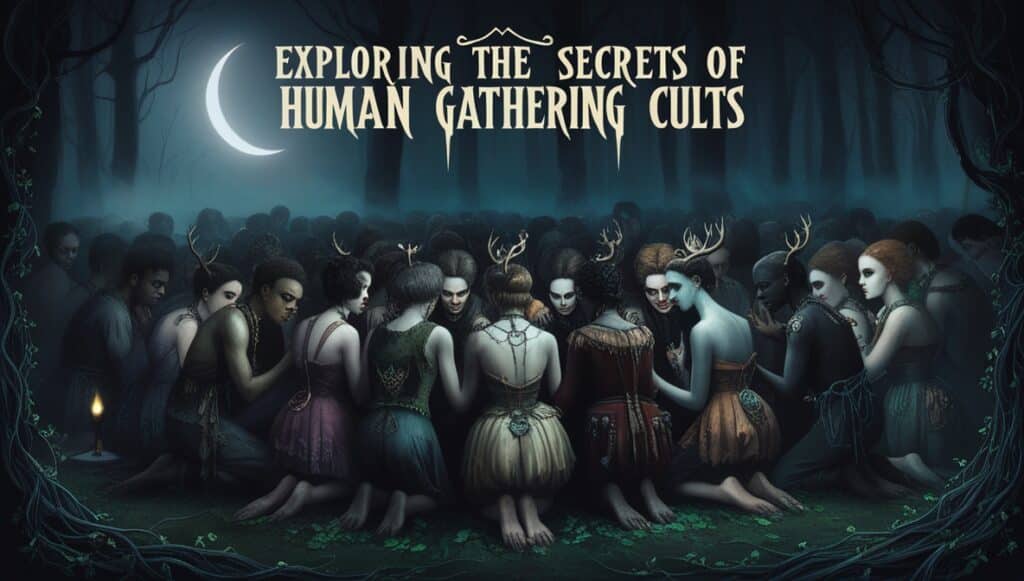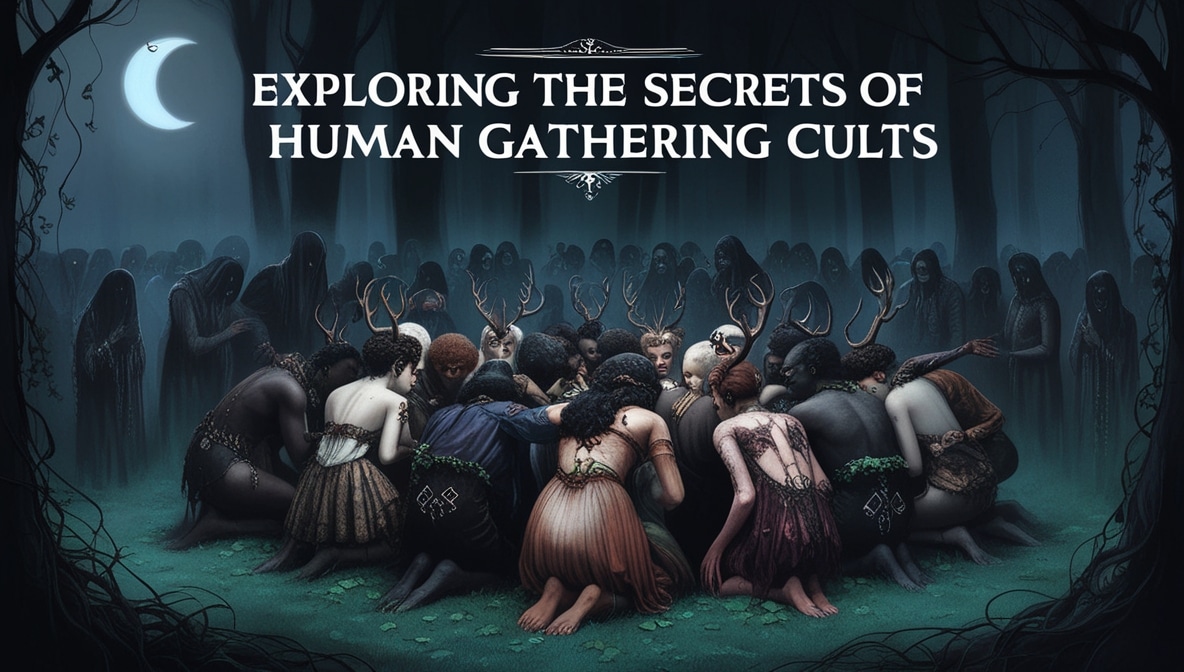The phenomenon of human gathering cults is both captivating and complex. These organizations, often steeped in secrecy and unique belief systems, attract individuals seeking connection, purpose, and community. In this comprehensive exploration of human gathering cults, we will delve into their characteristics, the psychology behind their allure, notable examples, and the impact they have on society.
Understanding Human Gathering Cults
Human gathering cults, often referred to simply as “cults,” can be defined as groups that espouse a religion or ideology that diverges from mainstream beliefs. They usually gather individuals through compelling charismatic leadership, persuasive ideologies, or communal activities.
Characteristics of Gathering Cults
- Strong Leadership
Many cults are led by a charismatic figure who serves as a spiritual leader. This individual often claims special knowledge or divine authority, making followers feel dependent on their guidance. - Isolation from Society
Cults frequently promote a sense of exclusivity. Members may be encouraged or required to disengage from outside relationships, creating a tightly-knit community centered around the cult’s beliefs. - Unique Beliefs and Practices
Cults often establish a unique worldview that distinguishes them from mainstream society. This can include alternative religions, spiritual practices, or unusual moral codes. - Intense Group Cohesion
Members often develop strong interpersonal bonds, as shared experiences and beliefs help to foster a sense of belonging. - Manipulative Tactics
Many cults utilize psychological manipulation techniques, including love bombing, fear tactics, or controlled environments to maintain cohesion and push members towards conformity.
Table: Key Characteristics of Human Gathering Cults
| Characteristic | Explanation |
|---|---|
| Strong Leadership | Charismatic leaders who claim special knowledge |
| Isolation from Society | Encouragement to disengage from outside relationships |
| Unique Beliefs | Distinctive worldviews that set them apart from mainstream beliefs |
| Intense Group Cohesion | Strong bonding through shared experiences |
| Manipulative Tactics | Psychological techniques to maintain control |
The Psychology Behind the Allure of Cults

Understanding why individuals are drawn to cults requires a look into human psychology. Several key psychological factors contribute to this attraction.
Desire for Belonging
Human beings are inherently social creatures. The need to belong is fundamental, and in an age marked by increasing personal isolation, cults offer a sense of community. The bonds formed within these groups can meet emotional and social needs, making them appealing to those who feel lost or disconnected.
Search for Meaning
Cults often provide clear answers to life’s existential questions. Members may turn to cults during moments of crisis, such as the loss of a loved one, unemployment, or periods of existential doubt. The promise of purpose and direction can be powerful motivators.
Psychological Manipulation
Cults often employ manipulation techniques—such as love bombing (overwhelming new members with affection) and doomsday prophecies—to create dependency on the group. Through this manipulation, individuals may lose their sense of self and agency, making them more susceptible to conformity.
Fear of the Outside World
Many cults cultivate a narrative that paints the outside world as dangerous, corrupt, or filled with temptation. This fear can continue to bind group members tightly, reinforcing the idea that the cult is their only safe haven.
Notable Examples of Human Gathering Cults
Exploring notable cults enriches our understanding of their dynamics and societal impact. Here are some of the most well-known cults in history.
The Peoples Temple
Founded by Jim Jones in the 1950s, the Peoples Temple attracted thousands with its promises of equality and social justice. However, it gained infamy when over 900 members died in a mass suicide-murder in Jonestown, Guyana, in 1978.
Scientology
Founded by L. Ron Hubbard in the early 1950s, Scientology claims to offer a path to spiritual enlightenment through a series of courses and “auditing” sessions. The organization is often criticized for its aggressive tactics against critics and its secretive practices.
Aum Shinrikyo
This Japanese cult, founded by Shoko Asahara in the 1980s, combined elements of Buddhism with apocalyptic beliefs. Aum gained notoriety after carrying out a sarin gas attack in the Tokyo subway in 1995, killing 13 people and injuring over a thousand.
Heaven’s Gate
Founded in the 1970s by Marshall Applewhite and Bonnie Nettles, Heaven’s Gate was notable for its beliefs surrounding extraterrestrial life and the end of the world. In 1997, 39 members committed suicide in a bid to reach a spacecraft that they believed was trailing the comet Hale-Bopp.
The Impact of Human Gathering Cults on Society
Cults can have far-reaching social implications, influencing their members, the communities they inhabit, and societal perceptions of belief systems.
Psychological and Emotional Impact on Members
Life within a cult can lead to a range of psychological issues, including anxiety, depression, and loss of identity. After leaving a cult, former members often experience emotional turbulence, lack of trust, and difficulty reintegrating into society.
Social Stigma and Mistrust
Cults often create a stigma not just for their direct members but can impact societal perceptions of alternative religions and belief systems. This can lead to misinformation, fear, and increased mistrust towards similar groups.
Legal and Ethical Concerns
Many cults have faced legal challenges due to their manipulative practices, resulting in investigations and potential criminal charges. Issues surrounding the rights of individuals within the organization often spark debates over freedom versus manipulation.
Personal and Economic Costs
Members may face significant personal losses, including financial burdens after donating their wealth to the cult or emotional costs when leaving behind relationships and support systems.
Leaving a Cult: Challenges and Recovering
Former cult members face numerous challenges when reintegrating into mainstream society. Understanding these difficulties can shed light on the urgent need for support systems.
Isolation and Alienation
After departure, many individuals feel an acute sense of isolation. Their experiences may lead to fear of trusting others, making it difficult to establish new relationships.
Identity Crisis
Leaving a cult often results in a crisis of identity. Individuals may struggle to redefine their personal beliefs and values, as they have spent years adhering to the group’s ideology.
Psychological Support
Access to psychological support is crucial for former cult members. Therapy can help address trauma, anxiety, and issues with self-worth that often arise from these experiences.
Support Networks
Establishing connections with ex-cult members through support groups or online forums can significantly aid in the healing process. Sharing stories and experiences fosters a sense of community.
Table: Challenges Facing Former Cult Members
| Challenge | Description |
|---|---|
| Isolation and Alienation | Difficulty forming new relationships |
| Identity Crisis | Struggles to redefine personal beliefs |
| Psychological Support | Need for mental health resources |
| Support Networks | Importance of connecting with others |
Prevention and Awareness Initiatives
Raising awareness and educating individuals about the characteristics and tactics of cults can promote prevention.
Educational Programs
Schools and community organizations can introduce educational programs focusing on critical thinking, media literacy, and the psychological tactics used by cults.
Online Resources
Websites and online platforms provide critical information about cults, their tactics, and how to recognize potential manipulation.
Community Support
Building strong community bonds can reduce the allure of cults by providing individuals with the connections and support they may otherwise seek elsewhere.
The Future of Human Gathering Cults
As of 2024, the landscape of cults continues to evolve. Here are some pertinent trends and predictions about the future of human gathering cults.
Digital Cults
The rise of the internet and social media has transformed how cults operate. Online platforms can serve as recruitment tools, leading to a new generation of digital cults.
Increasing Awareness
With the growth of awareness campaigns, society is becoming more equipped to recognize and address the manipulative tactics used by cults.
Mental Health Advocacy
As conversation around mental health continues to evolve, resources are becoming more accessible for ex-cult members. This accessibility may enhance the recovery process.
Legal Reforms
Ongoing discussions about the legal rights of cult members and their protection could lead to reforms creating safer environments for individuals vulnerable to manipulation.
Conclusion
Exploring the secrets of human gathering cults unveils a complex interplay of psychological, social, and emotional factors that attract individuals to these organizations. Understanding the characteristics and consequences of cult involvement is crucial in fostering awareness and providing support for those affected. As society evolves, so too will the dynamics of cults, making it essential to remain vigilant and informed about their practices and effects.
By analyzing the allure, impact, and challenges associated with cults, we can take steps toward prevention, recovery, and ultimately, a better understanding of human values and community.

Mark Joseph is a professional writer at Style Magazine US and has experience of more than 5 years in writing news and style articles.

